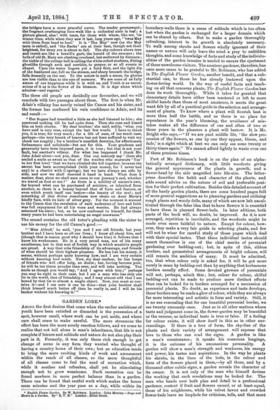GARDEN LORE.*
Amoxo the first desires that come when the earlier ambitions of youth have been satisfied or discarded is the possession of a spot, however small, where work can be put aside, and where care shall cease to make careful. The more strenuous the effort has been the more surely reaction follows, and we come to realise that not toil alone is man's inheritance, that life is not complete if leisure and solitude and nature do not also play their part in it. Formerly, it was only those rich enough to get change of scene in any form they wanted who thought of having a country home of their own ; but as education tends to bring the more exciting kinds of work and amusement within the reach of all classes, so the more thoughtful of all classes come to feel the need of recreation which, while it soothes and refreshes, shall yet be stimulating enough not to grow wearisome. Such recreation can be found nowhere in more perfect balance than in a garden. There can be found that restful work which makes the hours seem minutes and the year pass as a day, while within its English Flower Garden. By W. Robinson. London : John Murray.—Days and Hours in a Garden. By 'E. V. B." London : Elliot Stook. boundary-walls there is a sense of solitude which is too often lost when the garden is exchanged for a larger domain which can be shared by others. But to make a garden thoroughly refreshing, interest in its growth is absolutely necessary. To walk among shrubs and flowers wholly ignorant of their names or nature will only leave the mind a prey to unbidden. thoughts, and some knowledge of facts and study of the individu- alities of the garden inmates is needed to ensure the ejectment of these unwelcome visitors. The amateur gardener, therefore, has once more cause to be grateful to Mr. Robinson, who has added. in The English Flower Garden, another benefit, and that a sub- stantial one, to those he has already bestowed upon the flower-loving world. In the way of useful facts and teach- ing on all that concerns plants, The English Flower Garden has- done its work thoroughly. While it takes for granted that elementary details have either been mastered or left to more skilful hands than those of most amateurs, it meets the great want felt by all of a practical guide in the selection and arrange- ment of plants. To know where a plant will flourish best is more than half the battle, and as there is no place for repentance in the year's blooming, the avoidance of mis- takes makes all the difference of one and often of two or three years in the pleasure a plant will bestow. It is Mr. Bright who says,—" If we are past middle life, the slow pro- cession of the flowers, as one by one they appear, bloom, and fade,' is a sight which at best we can only see some twenty or thirty times again." We cannot afford lightly to waste even one of these precious times.
Part of Mr. Robinson's book is on the plan of an alpha- betically arranged dictionary, with little woodcuts giving the general appearance of the plants in growth, and a flower-head by the side magnified into life-size. The letter- press describes the habit and character of the plants, and adds sound advice on the nature of soil and preferable posi- tion for their perfect cultivation. Besides this detailed account of all the hardy garden plants, there are some hundred pages full of more general suggestions as to planning gardens and utilising rough places and woody dells, many of which are now left uncul- tivated through the false idea that to have flowers it is essential to have them in planned flower-beds. In later editions, both parts of the book will, no doubt, be improved. As it is now arranged, repetition is inevitable, and the woodcuts might be made even more faithful to nature. Except for colour, how- ever, they make a very fair guide in selecting plants, and few will not be wiser for careful study of those pages which deal with their special tastes. That these individual tastes should assert themselves is one of the chief merits of perennial gardening over bedding-out ; but, in spite of this, ribbon borders, and geometrical arrangements of bright colours, will still remain the ambition of many. It must be admitted, too, that when colour only is asked for, it will be got more surely in mass by bedding-out than by anything that herbaceous borders usually effect. Some devoted growers of perennials. will not, perhaps, admit this ; but, colour for colour, skilful bedding-out can be made to produce more distinct effects than can be looked for in borders arranged for a succession of perennial plants. No doubt, as experience and taste develope, these borders may be made a glow of colour, while they are always far more interesting and artistic in form and variety. Still, it is no use concealing that for one beautiful perennial border, we see twenty uncomely ones. Just as in all other matters where taste and judgment come in, the flower-garden may be beautiful or the reverse, as individual taste is true or false. If a feeling for colour exists, it will show itself in this as in other sur- roundings. If there is a love of form, the sky-line of the plants and their variety of arrangement will express that love to those who can read the signs. A garden is like a man's countenance ; it speaks his conscious longings, it is the outcome of his unconscious personality. A garden will show a man's strength and weakness, his energy and power, his tastes and aspirations. In the way he plants his shrubs, in the lines of the beds, in the colour and form of the flowers placed in them,—by all these, and by a. thousand other subtle signs, a garden reveals the character of its owner. It is not only of the man who himself devises the working that such revelations may be looked for. The man who hands over both plan and detail to a professional gardener, content if fruit and flowers exceed, or at least equal, those of his neighbours, while his velvet lawns and crowded flower-beds leave no loophole for criticism, tells, and that most plainly, in what lines ambition runs. Such a garden brings its own reward. The local flower shows are enriched, and admira- tion and applause content the owner. But not in these lie the keenest joy of the real garden lover. His frnitmay grace the tables of himself and his friends, his plants take prizes at every show, and his flowers are the wonder of his neighbourhood; but it is in the growing, not the showing, that the real pleasure has con- sisted. The anxious watching against late frosts, the pruning and moving that have been a fearful joy through the capricious months of an English spring,—these it is for which he has lived. Each plant is known by name, and has its special place in border or rockwork ; each separate flower has counted in the artistic arrangement of form or colour; each has played its individual part in the living drama of the year. Not by chance or caprice have plants found their way into given corners. This border is too sunny for one, that shrubbery too shady for another. The blue delphinium would not harmonise with the purple campanula, while the scarlet lichnis throws up into still whiter purity the Madonna lily of "high- summer skies." Among the bracken, the auratum spreads its grand petals, to link on the wealth of beauty and cultivation to the humbler brotherhood of fern and bramble. Every part of a garden should be full of intention. If, at this season of the year, the lawn is not of velvet character, close shorn and smooth levelled, it is because crocus and snowdrop show like jewels from their green setting, while primroses spring up in strange, unusual spots, which would work their ruin in better-regulated garden homes.
But to run over the unexpected charms of the garden home would be to outrun all limits of space and patience. If pleasant memories of garden joys are wished for, they can be found in Days and Hours in a Garden, written by "E. V. B." Based much on the plan of A Lancashire Garden, Mrs. Boyle blends suggestions with memories, and shows her readers that her plants do not flower unheeded and unloved. To all who would know something of the delight that a garden can afford, we recommend the book; and with that and The English Flower Garden, the coming summer should not only be more fertile than usual in substantial garden treasures to those already possessed of them, but should prove a season of fresh pastime and delight to those who would will- ingly share these pleasures, but who have not yet learned the way to them.



































 Previous page
Previous page